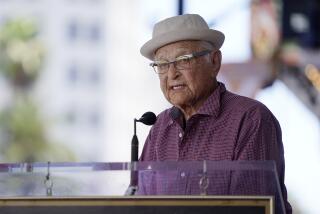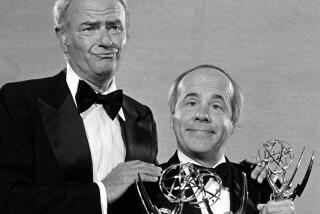Because time has not stilled one golden voice of radio, it’s not too late to tune in
- Share via
Norman Corwin, the boy wonder of radio in the 1930s and ‘40s, turned 75 not long ago, and 400 of his friends gathered at the Beverly Hilton, at $100 a plate, to celebrate his birthday.
Corwin is still a wonder. A writer of poetry, plays, radio drama, television drama, books, essays, music and motion pictures, he has no equal as the voice of America’s conscience and hope.
At present he teaches radio and television arts at the USC School of Journalism, and the money raised by the birthday dinner will go to a scholarship fund at USC in that field.
Anyone who remembers the golden age of radio, before TV burst on the scene, can never forget such Corwin masterpieces as “We Hold These Truths” and “On a Note of Triumph”--the stirring four-network show he wrote and directed in celebration of VE-Day.
Do you remember how it began?
“So they’ve given up.
“They’re finally done in, and the rat is dead in an alley back of the Wilhelmstrasse.
“Take a bow, GI. . . .”
Robert Nathan, who died recently at 92, wrote of watching CBS’s 50th-anniversary celebration on TV. The picture was of Walter Cronkite, but the words seemed too stirring for Cronkite.
“I began to sit up and look uneasily around me,” Nathan wrote. “Was this Cronkite? ‘No eye has roved like the video eye away and beyond the reach of Earth out to the moon and onto it.’ And as he went on, I found myself more and more uneasy, obscurely disturbed and excited, with a curious lifting of spirit, almost a memory of something young and high-hearted and far away. Until--wait a moment! I cried, that isn’t Cronkite! I know that voice, those singing words, those sweeping rhythms, I know them from somewhere long ago, from someone. . . . By God! It’s Corwin!
“I watch Cronkite, and I heard him: ‘When at last this reaches you, know that it went out from a small planet with one moon and a billion families.’ But it is Corwin I hear, and I am suddenly young again and my heart lifts as it used to in the long-ago dark years, and the old sense of happiness and greatness touches me, and for a moment is with me again. . . .”
Anyone who is satisfied with the quality of life in this country today should read Corwin’s latest book, “The Trivializing of America,” and hear his witty and stylish trumpeting about the deterioration, through greed and mediocrity, of everything we hold dear--from entertainment and sports to religion, science and law.
“It is no accident,” he says, “that Soviet paintings, sculpture, architecture, design, journalism and literature are as stolid and dull as the country’s political Establishment. In America, fortunately, there is too much raw assertiveness and competition for that particular type of ossification to set in, but mediocrity and stereotypicality are nevertheless fed by deep springs in our culture, by the leveling effects of media, by celebrity worship, the trivialization of education, the proliferation of kitsch, and the power of money to sway, if not buy, elections. . . .”
In “13 for Corwin,” 13 essays on Corwin and early broadcasting by friends and colleagues (edited by Francis Ring and published by USC especially for the dinner), Charles Kuralt observes:
“Norman Corwin can do anything with words. Once he wrote a radio play about chemistry. He wrote it all in verse. If he walked into one of the network offices today and said, ‘I have a play here, in verse, about chemistry,’ they’d call a guard to assist him to the street. Corwin’s play about chemistry starred Groucho Marx, Robert Benchley, Vincent Price, Sylvia Sidney and Keenan Wynn, among others. It was wonderful. Wonderful words have vanished from the air. . . .”
Norman Lear wrote: “Corwin’s passion was, and is, to expand the universe of sounds heard and feelings felt by radio listeners. . . . Especially in matters of timely national import--such as World War II--Corwin illuminated the moral landscape with his broadcasts, drawing upon his skills as a reporter, writer, poet, scriptwriter, director, and producer. CBS, to its lasting credit, gave Corwin the latitude to experiment and follow his impulses. . . .”
Studs Terkel wrote: “Corwin’s hand is still on the plow, his eye on the prize. His polemic against those who would flatten us out (and who appear to be succeeding) is by its eloquent nature a plea for that which would raise us. It is not a note of triumph he is sounding; it is a note of challenge. Against the odds, perhaps; which is why it is all the more stirring. . . .”
Corwin made a little talk at the dinner, and, as usual, he ended on a note of hope:
“Decency. Consideration. Tenderness. . . . Are they far out? Declasse? Sentimental? Corny? I submit that if we are warmed by a picture of a gorilla petting a kitten, and touched, almost against our will, by a TV commercial in which a kid offers a cold drink to a bruised and weary football player after a lost game . . . if a soft answer can still turn away wrath as effectively as when it was first endorsed in the Bible, then we have not become hopelessly and irreversibly cynical, and there is a chance that one day mankind, a relative newcomer to the animal kingdom, will stop snarling and snapping, and wish to all its members a nice day and a nice year and a few nice millennia. . . . “
And that was hardly his valedictory. Corwin’s father is 108 and clear of mind. They talk by telephone once a week.
We haven’t heard the last of Corwin yet.
More to Read
The complete guide to home viewing
Get Screen Gab for everything about the TV shows and streaming movies everyone’s talking about.
You may occasionally receive promotional content from the Los Angeles Times.






